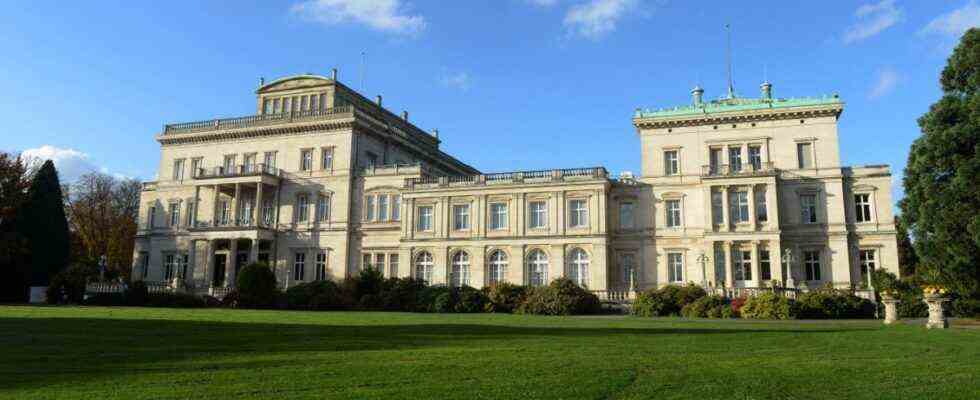When Hetty Berg was supposed to give a lecture at the Villa Hügel in autumn, the director of the Jewish Museum Berlin hesitated for a moment. The magnificent villa, the former residence of the Krupp family, reminded them that Hitler’s Germany had once attacked their homeland, the Netherlands, with weapons from Krupp, Berg warned. As the Krupps grew richer, Jewish people were persecuted, expelled and murdered.
It is now clear: the invitation to speak was just an indication that the Alfried Krupp von Bohlen und Halbach Foundation – the largest shareholder in the Thyssenkrupp Group – is now dealing with the history of its founder: Alfried Krupp was the last sole owner of the company croup. The foundation bears his name, says Ursula Gather, head of the board of trustees. “This also results in a responsibility to deal with the biography of our founder.”
If the Essen-based organization is now spending 90,000 euros as a first step to close possible gaps in the commemoration, then that is also a pointer for many other companies that have also not yet fully come to terms with their Nazi past.
Ursula Gather has watched over the Krupp Foundation as Chair of the Board of Trustees since 2013: The organization is the largest shareholder of today’s Thyssenkrupp Group.
(Photo: Federico Gambarini/dpa)
“Our knowledge of Alfried Krupp is limited,” says Eckart Conze. The history professor from Marburg has been looking for and examining historical sources since this month – together with an employee and student assistants. It is undisputed that Alfried Krupp joined his family’s company in 1935 and headed the raw materials and armaments department from 1938. In 1943, the engineer rose to become the boss and sole proprietor of a company that was one of the most important armaments suppliers to the Nazis.
So far, little is known about the young Krupp’s friendships or networks
During the Second World War, the Krupp company – like many companies in the Nazi Reich – exploited forced labourers, including Jewish ones. Alfried Krupp was convicted in the Nuremberg war crimes trials: for slave labor and looting in foreign countries that Germany had occupied. In 1951 the entrepreneur was pardoned.
Nevertheless, the memory of the people remain “all in all pale,” says historian Conze. It is known that Alfried Krupp had already become a member of the SS in 1931. However, “very little is known so far” about friendships or networks at this time, according to the historian. The publicist Golo Mann once worked on a biography, but never finished it: Alfried Krupp probably seemed too boring and unproductive to him.
Photo from 1960: Alfried Krupp von Bohlen und Halbach grew up in Essen and studied in Munich, Berlin and Aachen before joining the family company.
(Photo: Historical Archive Krupp/OH)
But memories of National Socialism are changing, says Conze. “Each generation poses new and different questions to history.” This is particularly true since the generation of contemporary witnesses to the Holocaust is dwindling.
Conze and his team are now taking nine months to research the sources. The Krupp Historical Archive alone has 33 linear meters of shelves full of files from Alfried Krupp’s secretariat, plus press reports from Germany and abroad. But Conze also wants to rummage through archives and estates outside of Essen. After that, he and the foundation want to decide whether the project could result in a scientific biography of Alfried Krupp.
After the war, Krupp’s policy was to stop producing weapons
What makes the fall of the company significant beyond the borders of the Ruhr area are also historical counter-movements and the counter-figure: Alfried Krupp returned to the top of the company in 1953, but at the same time appointed Berthold Beitz as general manager. Previously, as a manager in the oil industry, Beitz had saved several Jewish people from deportation. In Yad Vashem, Beitz was honored as Righteous Among the Nations – a completely contrary biography.
Added to this was the principle that the company should no longer produce weapons after the Second World War. Formally, Krupp concentrated on steel production and plant construction – whereby steel and components made from it can ultimately also be used in armaments. The Thyssenkrupp group, which has been merged since 1999, still builds submarines and naval ships today.
Photo from 2012: Berthold Beitz shaped the steel group as head of the foundation and long-standing chairman of the Krupp supervisory board.
(Photo: Rolf Vennenbernd/dpa)
After Alfried Krupp’s death in 1967, his assets were transferred to the said foundation, which today holds around 21 percent of Thyssenkrupp shares. With the dividends from the company’s good years, the organization supports charitable projects in science and education, art and culture as well as education and sport. However, Thyssenkrupp has not paid out any profits for the past three years because the group is in a crisis. They are working hard to be able to pay a dividend again soon, said Thyssenkrupp boss Martina Merz at the most recent annual general meeting.
In any case, on that October evening in 2021, Hetty Berg decided to give the speech in the Villa Hügel with its wood paneling and meter-high walls. After all, the Krupp Foundation is committed to German-Jewish understanding. “If I hadn’t come,” Berg said at the time in what used to be the living room of the Krupp family with its creaking parquet floors, “then an opportunity for exchange, for mutual listening, speaking, contradicting and understanding would have been lost.”

